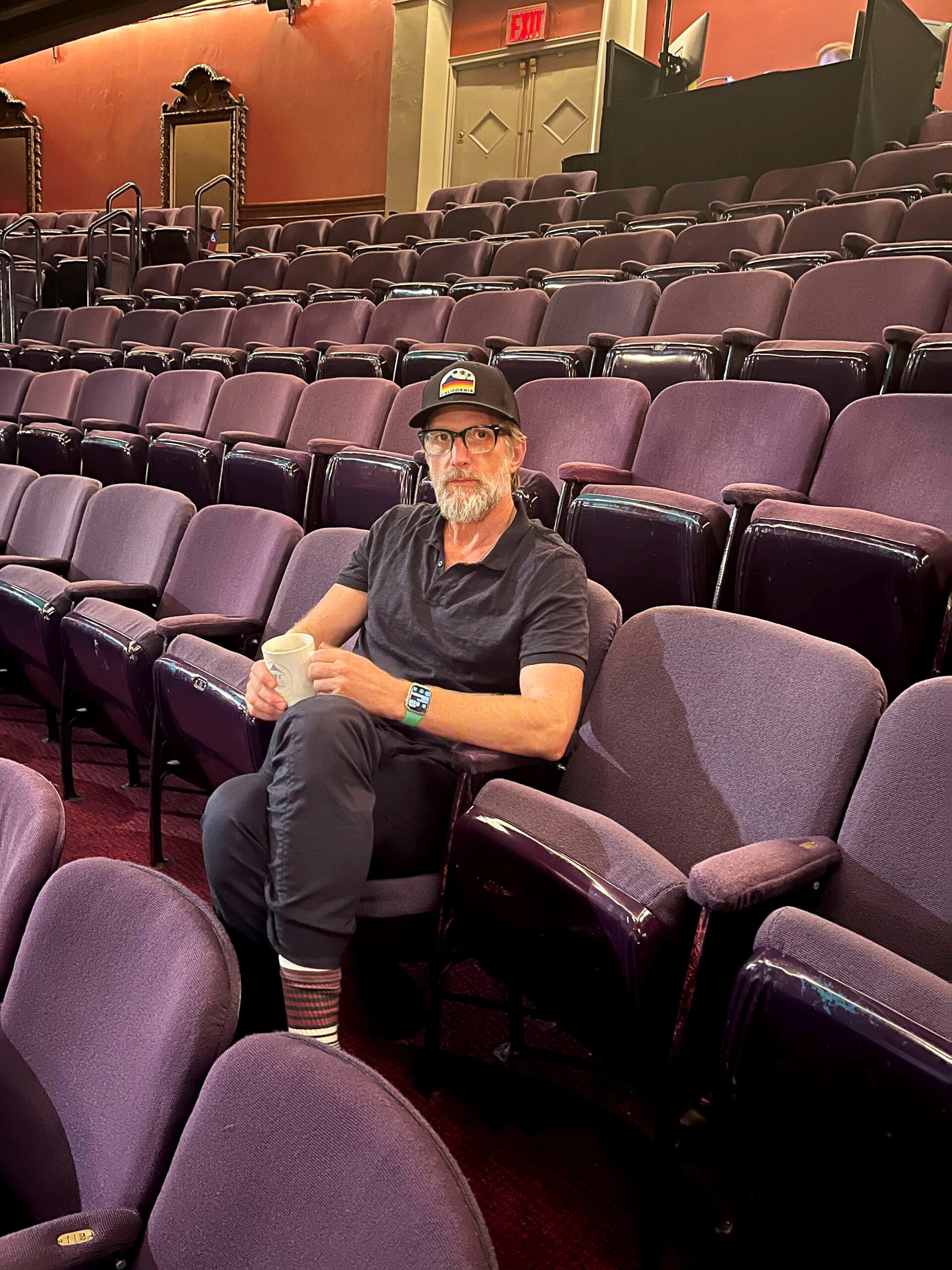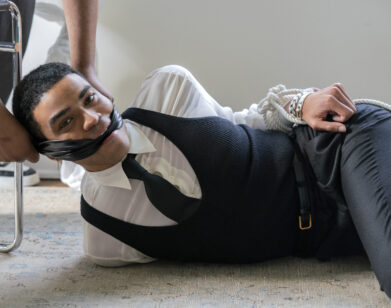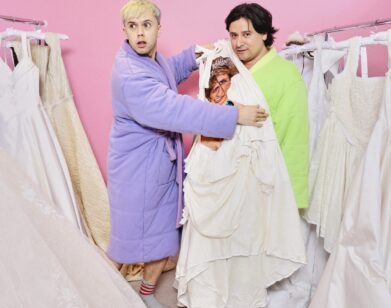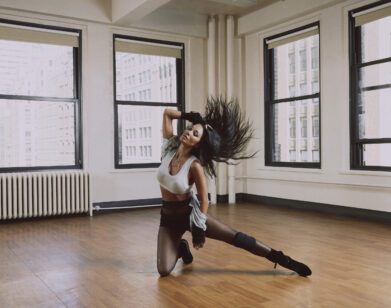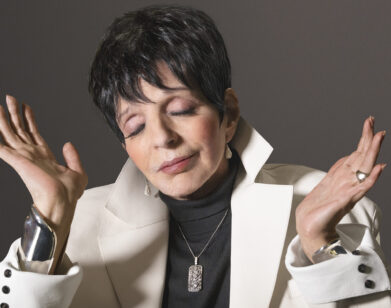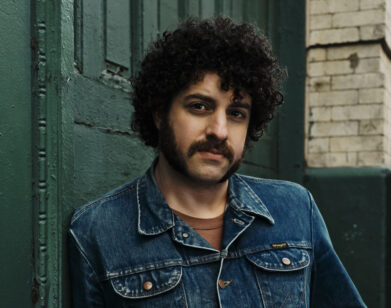MEZZANINE
Paul Sparks Invites Us to Broadway to See His Chamber of Horrors
At the Lyceum Theater, Paul Sparks is the picture of calm. In two hours, the curtains will rise for the final performances of The Grey House, the haunting, Joe Mantello-directed thriller in which Sparks stars as Henry, one-half of a married couple who wreck their car in a snowstorm and take shelter in a house where nothing is as it seems. But for now, with his coffee mug in hand, Sparks betrays no fear. “They’re unassuming,” the actor says of he and Tatiana Maslany’s characters. “And then, suddenly, they’re just put through the ringer.” For that, he can thank Laurie Metcalf, a Broadway veteran who lords over this cabin in the woods with a sisterhood of eminently spooky girls led by Sophia Anne Caruso and Millicent Simmonds. As the stage manager took roll call, Sparks settled into a seat in the mezzanine to talk about the mechanics of horror, the many variables of live theater, and his next project, further downtown, doing Waiting for Godot opposite his old friend Michael Shannon.
———
JAKE NEVINS: I know you’re a New York guy. Is it nice you get to post up here for longer than you’re used to, now that work is on Broadway?
PAUL SPARKS: I came to New York in 1992. I was originally from Oklahoma so I moved out here to go to school, undergrad at NYU, and then I just stayed. But I’ve been here ever since.
NEVINS: You’ve done quite a bit of stage work: some Ibsen, some Albee. What sort of opportunities or challenges does theater present, vis-à-vis the screen?
SPARKS: Well, for me, the theater is the best. This is the best job. They don’t pay the best, but they are the best jobs. I’ve always thought of it as like, television is for the writer. That’s the person who comes in first and leaves last. Film is really for the director. And the theater, it’s for the writer, but it’s also for the actor. It’s our experience of not only decoding a play, but performing it every day. So no matter the size of your part, you feel involved in the totality of the whole thing and it makes the theater a really special, satisfying experience. In most cases, when you get to the end, and even sometimes in the middle, you feel like you really understand it, like you’ve worked on it, you’ve thought about it, you’ve made lots of mistakes with it and you’re able to add that extra element, which is the audience, which changes it each night. “Mastery” sounds like you figured it out and you do it perfectly, which is not the case, but there is a sort of total knowledge that you have that allows you to really experience what’s going on in the moment. Whereas, with film and television, you’re kind of by the seat of your pants a lot. Here, we know. It’s interesting to me when an audience member asks, “How do you memorize all those lines?” Any actor that’s done stage work, it’s a hard question to even answer. Because it’s like, “Well, of course you know your lines, you’ve been working on it eight hours a day for the last month.” It’s impossible not to learn them.
NEVINS: I got to see the show a few weeks ago. Performing eight shows a week over the last few months, have you made choices on stage that surprised you? Or, at some point, do you find the optimal approach to the material and stick with it?
SPARKS: It’s different in different moments. The Grey House is really a technical show. Levi [Holloway] wrote it in a really technical way. It’s really spelled out and, though at times it feels like people are speaking over one another or sort of stuttering to get their lines out, all of that is written. So he’s been very specific about those moments. And in order to actually surprise or scare someone, there are certain ways to do that that either work or they don’t. I think timing plays a big role. I think when we came in here we had no idea how the audience was going to react to it. But you learn what works, and things change, to greater or lesser effect. From the inside, [those changes] can feel seismic, like these huge swings. “Oh, we had a great night tonight.” Or, “Oh, it was a really terrible night.” But I suspect that the changes feel bigger to us than they actually are. It’s one of the reasons I like doing theater. Somebody will give me notes if I add minutes to the show, you know what I’m saying? It is impossible not to be affected day by day by the audience and the other actors that are on stage and the strange gremlins that live in live theater.
NEVINS: When I saw it, I actually had a coughing fit during the first act that lasted like, three minutes. My friend was like, “Do you wanna step out?” Anyway, I hope you didn’t notice.
SPARKS: No, I didn’t notice. It does happen, though, and people’s phones go off, you know? It’s the world we live in. I’ve done a lot of theater downtown. I’m used to being in smaller spaces. And one of the things that you get used to in a really small space is how the audience is culpable. You can see them. There’s no hiding. They bring their energy, whatever they’ve got going on, whatever discussion they had over dinner. And I feel like this theater is built in a way where, if the audience has a coffee or whatever, that’s part of the show. It’s important. You’re not on your couch, you’re here with us. And that’s what I want. We’re gonna put our trust in you that you’re gonna take care of us. We’re gonna take care of you. And we’re all gonna do this thing together. I love that about the theater.
NEVINS: You mentioned elsewhere that not a lot of shows like this make it to Broadway, which got me wondering about your relationship to the genre of horror.
SPARKS: So, I took over from Mike Shannon in Bug when it was downtown at the Barrel Street, this Tracy Letts play. Are you familiar with that play?
NEVINS: Yes. Love Tracy Letts.
SPARKS: So I had seen it with him and I mean, it was crazy. Now because I did it, I know that there was no smell, but I feel like I could smell the gasoline at the end when they poured it on top of themselves and the place went up in flames. And it was so interesting to me how they were able to affect real jump scare moments in that play. And much like Joe Mantello, Dexter Bullard, who directed that, was extremely precise and technical about how to sort of manipulate where an audience looks, which is a really hard thing to do in the theater. To take someone’s eye away on the stage is very, very difficult. It’s hard to make them look over here when they wanna look over there. So it’s like a magic trick, and it takes some sort of ingenuity. So, I love it. I think that horror is a cathartic medium, where a delicious bunch of emotions that happen inside you, so I’m curious about it as an actor. I read this particular show and I was shocked they were doing it on Broadway because I was not aware that this was something that could be done on Broadway. Because not only was it scary, but it was also kind of opaque. It’s a bit like you get on the ride and you’re affected by it and you aren’t able to process every loop and twist and turn on the roller coaster. But you know that you’re going through something quickly.
NEVINS: Right, it’s pretty densely allegorical. And a lot of horror is, but I’d say it usually doesn’t take quite so much parsing. I had to find my bearings in a way that was exciting and almost participatory.
SPARKS: Yeah, I think that’s true. I think this manages to be two things at once. The tree is falling and it’s going to hit the ground and it starts slow and then goes faster and faster. There’s an aspect of inertia of this show that moves in that way. But then there’s also this kind of code of like, “What are the rules here?”
NEVINS: What’s it like working with Tatiani Maslany and Laurie Metcalf. Laurie is one of my favorite actors in human history.
SPARKS: I don’t know what exactly Laurie is doing or where she comes from, what planet that she hails from. She has a special sort of relationship to the way she does a character, the way she presents herself on stage. It’s difficult to describe. It’s a bit private. She doesn’t share all the secrets of what she’s thinking, but there’s clearly so many things going on.
NEVINS: Do you mean in her process and preparation, or the performance as it manifests on stage?
SPARKS: You know, sometimes you go into a room with a bunch of actors and they just talk and talk and talk about all the things they’re thinking about, who they are and their experiences and how that all sort of informs them. And you learn maybe too much about a person and their process. But it’s really interesting with her. She’s clearly doing all that work, and even in the first day of rehearsal you’re sort of wrapped up. She has a hold of your attention. It’s really special to see that process.
NEVINS: I bet. And Tatiana?
SPARKS: Just on top of being such a fantastic, inventive, unique, and surprising actress, she’s also just one of the most lovely people, and that has been a delight. Because what happens is, you get linked to people in shows based on your relationship with the characters in the show, and sometimes it’s hard if you don’t necessarily see eye to eye about how things ought to go. But with us, it’s just been really great. She’s very supportive. She’s really good. It’s been a hard process. It was not easy to tell Henry and Max’s story. There is a lot of opaqueness about what exactly is going on. So we’re trying to tell the story of our complicated relationship in the midst of being like, terrorized by children.
NEVINS: Right, and it sort of crescendos as you guys become increasingly cognizant of what’s going on. At the beginning, they’re pretty unassuming.
SPARKS: They’re unassuming and then, suddenly, they’re just put through the ringer. And the traditional way of working on a character for me is like, “Ok, I start here and I go there. How do I get there?” And with this one, it’s not [like that]. It wasn’t always obvious, but I feel like I found a route that I’m really proud of.
NEVINS: You found a route, but your character gets stranded. Has that ever happened to you?
SPARKS: Have I ever been stranded? The only time I was ever really stranded was actually when I was young, just out of college. I went backpacking in Europe and I had virtually no money whatsoever and I had a year-long rail pass which sort of provided me a certain amount of time to travel. After a few months, I had made my way to Greece, but I couldn’t go to any of the fancy parts of Greece. So I was in the south of Kalamata in a little tiny town. And I woke up one day, I was just camping on the beach, and I thought, “I’ve got to get back, I’ve got to get out of here.” And that ended up being a really difficult trip back to get from where I had been on this beach for a few weeks, not really talking to a lot of people. I had to get a plane to Paris. It took a few days. But as far as like, have I been snowed in? I mean, we were all stranded during the pandemic, weren’t we?
NEVINS: That’s true. Is the beard for the show?
SPARKS: Yeah.
NEVINS: Are you gonna lose that in a couple weeks’ time?
SPARKS: I’m not sure. I’m supposed to do another play in the fall, actually.
NEVINS: Anything you can share?
SPARKS: I think so. Michael Shannon and I are supposed to do Waiting for Godot at Theater For a New Audience.
NEVINS: Oh, wow. Congrats.
SPARKS: Mike is an old friend of mine and we’ve done many things together and we were trying to do it, but the pandemic happened. We were literally going to rehearsal on a Monday and everything got shut down the Thursday before. But it looks like it’s gonna happen.
NEVINS: Who’s Estragon and who’s Vladimir?
SPARKS: I think I’m Didi and he’s Gogo.
NEVINS: Well, I look forward to seeing that. I’ll let you get back to your dressing room.
SPARKS: Thank you.

